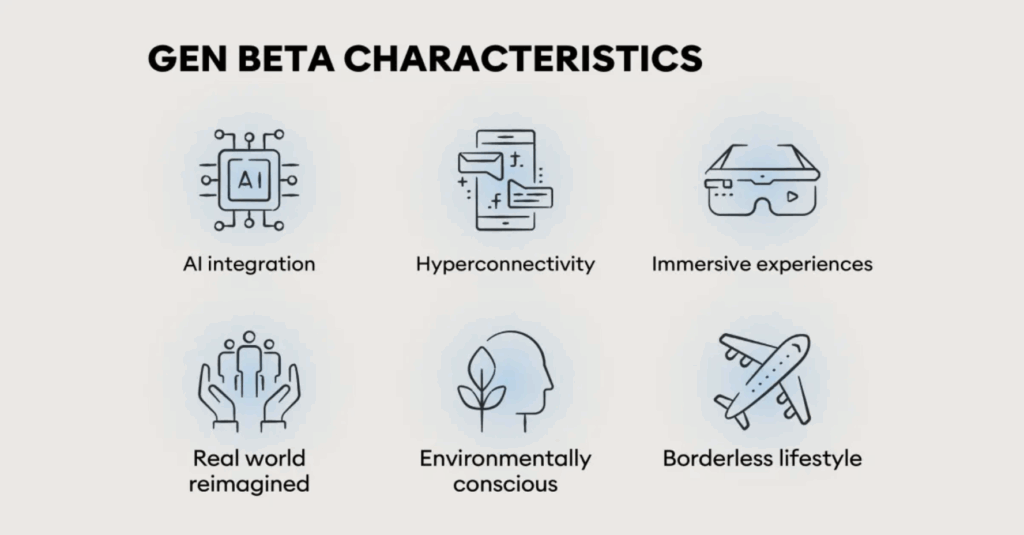By: Mark McCrindle
In 2025, we welcomed a new generation into the fold, Generation Beta.
Born between the years of 2025 to 2039, Generation Beta follows Generation Alpha (born 2010-2024). We named them Alpha and Beta (of the Greek Alphabet) to signify not just new generations, but the first generations that will be shaped by an entirely different world.
In 2030, the oldest Generation Beta children will start their schooling years. Born typically to Gen Y and Gen Z parents, these children are being raised in an era of technological acceleration. They will only know a world of Artificial Intelligence (AI), and predictive generative technology, where the interaction between the digital and physical world is seamless.

The six characteristics set to shape Gen Beta
1. AI Integration
If Gen Z was the first generation to experience social media in their formative years, and Generation Alpha were shaped in an era of the iPad and the smart device, then Generation Beta’s defining technology can be characterised as Artificial intelligence. Generation Beta will be the first generation to not know a world without Artificial Intelligence. As it evolves alongside this generation, we can expect it to define how they engage with shopping, education, work and community.
2. Hyperconnectivity
The emerging generations have only ever known a world of devices that make their lives easier. Having had access to digital devices from their first years, Generation Beta will be defined by this constant access and connectivity. The seamless integration of technology into almost all aspects of their life, means they will be used to constantly engaging with multiple devices and platforms. Not only will they be used to being constantly connected to multiple devices at the one time, but it will also be an expectation for how they engage with the world around them.
3. Immersive experiences
As the array of technological devices and social media platforms that we use becomes more sophisticated, so too does the blurring of the physical and digital worlds. It will be immersive for the emerging generation in a way that we are only seeing the start of, today. Generation Beta will likely be the first generation to experience autonomous transportation at scale, wearable health technologies, and immersive virtual environments as standard aspects of daily life. Their formative years will be marked by a greater emphasis on personalisation, with AI algorithms tailoring their learning, shopping, and social interactions in ways we can only begin to imagine today.
4. Borderless lifestyles
For Generation Beta, a borderless lifestyle means growing up in a world where traditional boundaries, whether geographical, cultural, educational, or even linguistic, are increasingly irrelevant. Thanks to global connectivity, decentralised work, and immersive digital experiences, their life will be more globally integrated than any generation before them. Just as Gen Z made online friends via social media platforms like TikTok, Gen Beta will likely grow up in immersive digital spaces where friendships span continents. It is likely that they will also have higher cultural literacy and awareness from an early age, because of it.
5. Environmentally conscious
Following in the footsteps of the values-driven generations before them, Generation Beta is expected to be even more environmentally conscious, shaped by the realities of a changing climate and a global push towards sustainability. From an early age, they will be raised in households, schools, and communities where environmental stewardship is not just encouraged but embedded into everyday life. With access to more advanced technologies and data-driven insights, Gen Beta will likely be both informed and empowered to take action, whether through the brands they support, the careers they pursue, or the innovations they help create. As the first generation to be entirely born in the 2030 agenda era, they will come of age in a world where sustainability is a central concern.
6. Real world imagined
Although Gen Beta are being shaped in a digital world, we are seeing a pushback on some of these immersive technologies and social media platforms, particularly by Gen Z parents. To combat the digital integration, we expect a greater priority to be placed on authentic relationships, the nature experience and human skills. These characteristics may then flow into classroom experiences, where AI and technology are viewed as co-creators, learning is personalised and on-demand, borderless lifestyles bring greater flexibility to school structures, and learning is truly an immersive experience.
Like any generation that has gone before, the opportunities of change are present, while so too are the challenges. As educators and leaders there is a responsibility to not just react to the changes, but adapt, with a considered approach, to these shifts for the benefit of Generation Beta. And even amidst all the change, it is helpful to remember that like the generations who have gone before, Generation Beta will benefit from environments that prioritise the deeply human needs of connection, community, growth and meaning, which are core to the human experience.
Article supplied with thanks to McCrindle.
About the Author: McCrindle are a team of researchers and communications specialists who discover insights, and tell the story of Australians – what we do, and who we are.
Feature image: Canva





